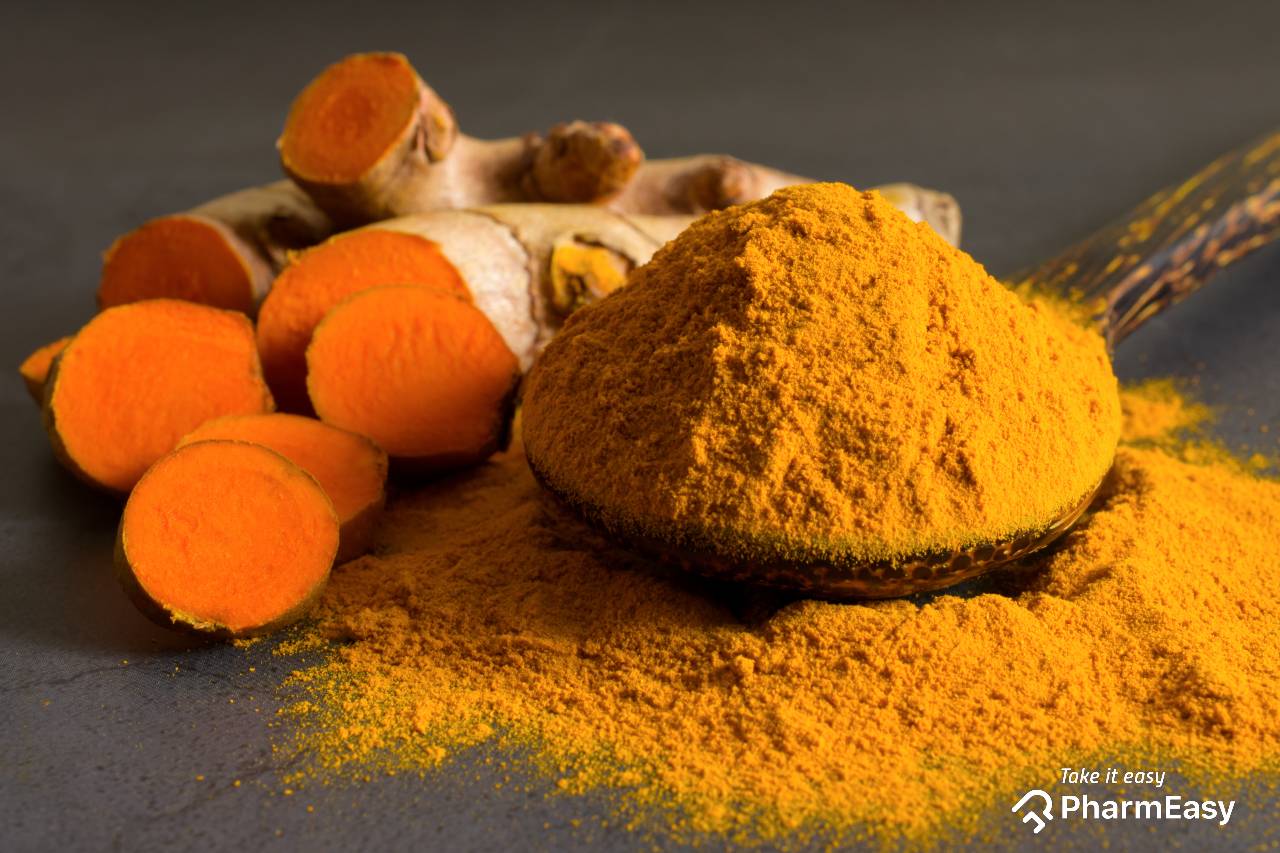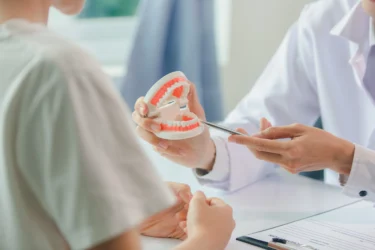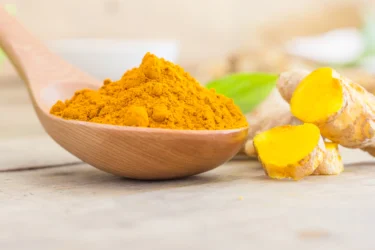Turmeric (Haldi): Uses, Benefits, Side Effects, and More!
By Dr Rajeev Singh +2 more

Get,

to manage your symptom
Get your,


4 Cr+ families
benefitted

OTP sent to 9988776655



You’ve successfully subscribed to receive
doctor-approved tips on
Whatsapp

Get ready to feel your best.

Hi There,
Download the PharmEasy App now!!


Register to Avail the Offer
Send OTPBy continuing, you agree with our Privacy Policy and Terms and Conditions

Hi There,
Sign up on PharmEasy now!!
Trusted by 4 crore+ families

OTP sent to 9988776655



You have unlocked 25% off on medicines




Code: NU25
By Dr Rajeev Singh +2 more
Table of Contents
Turmeric (Curcuma longa) belongs to the family Zingiberaceae and might be one of the most valuable herbal medicinal plants1. Turmeric is also referred to as Indian saffron due to its brilliant yellow colour2. Turmeric contains a yellow pigment called curcumin or diferuloylmethane, which is the principal ingredient responsible for its properties1,3.
Turmeric is distributed throughout subtropical and tropical regions of the world. It is extensively cultivated in Asian countries, especially in China and India. It grows up to a height of one meter and has a short stem1.

There are more than 100 components present in turmeric. The major component present in the root is a volatile oil consisting of turmerone. Other colouring agents like curcuminoids are also present in turmeric. Curcuminoids contain curcumin demethoxycurcumin, dihydrocurcumin, and 5′- methoxycurcumin, which are natural antioxidants. Turmerone, arturmerone, and zingiberene are the components responsible for the aroma of turmeric. Turmeric also contains a great amount of ω-3 fatty acid and α-linolenic acid (2.5%)2. In 100 grams of turmeric, the nutrients found are4:
Turmeric might possess properties like:
As a doctor, I often come across patients who inquire about natural remedies for managing arthritis. One popular option that has gained attention is turmeric. It’s interesting how turmeric, a spice commonly found in our kitchens, may be loaded with potential benefits for arthritis and other conditions9.
Dr. Siddharth Gupta, B.A.M.S, M.D (Ayu)

Turmeric (Haldi) might exhibit cardioprotective (heart-protective) effects mainly due to its potential antioxidant, antidiabetic, antiplatelet, and cholesterol-lowering activities. Turmeric’s cholesterol-lowering effect might be attributed to reduced cholesterol intake by the intestines and enhanced cholesterol conversion to bile acids in the liver1. However, heart diseases are to be treated by a specialist. Kindly consult a doctor for heart conditions.

Constituents of turmeric might have positive effects on the gastrointestinal system. According to a study5, the intestinal spasm may be inhibited by sodium curcuminate, a constituent of turmeric. Another component of turmeric called p-tolymethylcarbinol might enhance secretin, bicarbonate, gastrin, and pancreatic enzyme secretion. As per an animal study, turmeric might be helpful against the formation of ulcers that might be induced by factors like stress, alcohol, indomethacin (non-steroidal anti-inflammatory drug), reserpine and pyloric ligation (a condition that leads to gastric acid accumulation in the stomach) by increasing gastric wall mucous in animals when exposed to these gastrointestinal insults.
Turmeric might stimulate bile secretion, hence potentially helping improve the body’s ability to digest fats. This might aid in better digestion and may also help in the elimination of toxins from the liver5. However, more research is required to prove such claims.

Turmeric might be helpful against tooth decay and is used in the preparation of toothpaste due to its potential antibiotic, astringent (causing the contraction of cells to reduce bleeding from minor abrasions) and anti-inflammatory activities. It might help against bacteria responsible for the development of cavities and may also help tone the gums5. However, more research is required. Therefore, kindly consult a doctor and do not self-medicate.

A cataract is an eye disease caused by the oxidation of the lens in your eyes. The internal consumption of turmeric might help reduce the oxidation of the lens. Hence, it may be helpful in cataracts. It may also be helpful in relieving eye pain5. However, do not self-medicate and kindly consult a doctor for problems related to the eye.

Turmeric might be effective in arresting nosebleeds, clearing the sinuses, and restoring a quicker sense of smell. Turmeric may also help with cough, sinusitis, and dyspnoea (difficulty in breathing)5. However, these effects need to be ascertained by further research.

A variety of bacteria, disease-causing fungi, and parasites might be inhibited by turmeric extract and the essential oil of Curcuma longa. The aqueous extract of turmeric might exhibit antibacterial effects. The growth of several bacteria like staphylococcus, lactobacillus, and streptococcus might be suppressed by curcumin. Ether and chloroform extracts of turmeric exhibit antifungal potential. Turmeric might also possess antiviral properties. All these properties of turmeric may help fight against infection-causing microbes5.

Detoxification is the process of elimination of toxic substances from the body. The active constituent of turmeric, curcumin, might bind with heavy metals like lead and cadmium and decrease the toxicity of these metals. Turmeric may also be effective in dealing with poisoning and the purification of blood5. However, these effects need to be further researched. Kindly do not self-medicate. Consult a doctor.

Turmeric might help purify and nourish the blood which may lead to healthy and glowing skin. It might be effective for skin diseases like acne, eczema, etc. due to its antiseptic and antibacterial properties. It may also help against premature ageing. Turmeric is also a constituent of sunscreens and cosmetics5. However, its effects on skin need to be further researched.

Curcumin might be a powerful scavenger of oxygen-free radicals. The antioxidant property of curcumin is comparable to that of vitamin E, and C. Curcumin may significantly inhibit the generation of reactive oxygen species. The derivatives of curcumin, such as bisdemethoxycurcumin and demethoxycurcumin, also contain antioxidant properties. Pre-treatment with curcumin might help reduce oxidative stress caused due to ischaemia (a condition in which is there is restricted blood flow in a particular body part)1.
Though there are studies that show the potential use of turmeric in various conditions, but these are insufficient and there is a need of further studies to establish the true extent of the benefits of turmeric on human health.
I find it is very fascinating how a natural ingredient like curcumin might potentially support cognitive function. In a recent clinical trial, researchers discovered that taking 90 milligrams of curcumin, a compound found in turmeric, twice a day for 18 months had a positive impact on memory performance in adults who didn’t have dementia6.
Dr. Rajeev Singh, BAMS
Turmeric can be taken as a supplement or utilized as a spice. Turmeric can be incorporated into your diet by adding it to various foods like:
Turmeric is available in different forms like:
You must consult a qualified doctor before taking any herbal supplements. Do not discontinue or replace an ongoing treatment of modern medicine with an ayurvedic/herbal preparation without consulting a qualified doctor.
Let me share a gripping discovery. A study6 found that curcumin, the active compound in turmeric, might be effective in reducing symptoms of depression. It’s also believed that curcumin may help increase the levels of serotonin and dopamine in the brain, which are important chemicals involved in regulating mood. Isn’t it stunning how natural ingredients might potentially have such powerful effects on our mental well-being?
Dr. Smita Barode, B.A.M.S, M.S.
Turmeric has been established safe for use. However, despite this safety record, there have been some side effects. When taken in excess, the following side effects have been reported:
Alkaline phosphatase is an important enzyme that is associated with the presence of liver, bone and other diseases. Lactate dehydrogenase is an enzyme that is indicative of any tissue damage or disease8.
I would like to suggest considering turmeric as a potential natural remedy for muscle soreness after exercise. The active compound in turmeric, curcumin, may possess anti-inflammatory properties that may help reduce post-exercise muscle inflammation and soreness. While more research is needed to fully understand its effects, incorporating turmeric into your routine might be worth trying10.
Dr. Anuja Bodhare, B.A.M.S, M.D (Ayu)
Also Read: Cabbage (Patta Gobi): Uses, Benefits, Side effects By Dr. Rajeev Singh
The right dose of turmeric for you depends on your overall health. It is essential to talk to your physician before taking turmeric. Although the risk of side effects and drug interactions are unlikely, it is recommended that you stop consuming turmeric if you experience any ill effects.
Turmeric might cause bloating, and it is also advisable to avoid turmeric if you have gallbladder disease6.
Also Read: Reetha: Uses, Benefits, Side Effects, and More!
Turmeric might interact with blood-clotting medications. Hence, it is important to consult your doctor before consuming turmeric with these medications6.
Also Read: Urad Dal: Uses, Benefits, Side Effects, and more!
Turmeric (Haldi) is a spice that is obtained from the root of the Curcuma longa plant that is a part of the ginger family. The primary active constituent of turmeric is curcumin. Turmeric might have many health benefits6.
Turmeric is known by different names like turmeric root, Indian saffron, Curcuma longa, Curcuma aromatica and more9.
Turmeric might help enhance memory in adults without dementia (loss of memory, language, problem-solving and other thinking abilities). Curcumin might also help against Alzheimer’s disease6. However, such effects need to be proved by more research.
Turmeric might not be safe for use during pregnancy when taken in excess amounts. Hence, you must consult your doctor before taking turmeric during pregnancy9.
Turmeric might have haemostatic property (ability to arrest bleeding) and a great healing property due to its anti-inflammatory and antimicrobial effects. According to animal studies5, turmeric exhibited a potential healing effect on septic and aseptic wounds in animal models. However, more research is required to prove such claims.
Disclaimer: The information provided here is for educational/awareness purposes only and is not intended to be a substitute for medical treatment by a healthcare professional and should not be relied upon to diagnose or treat any medical condition. The reader should consult a registered medical practitioner to determine the appropriateness of the information and before consuming any medication. PharmEasy does not provide any guarantee or warranty (express or implied) regarding the accuracy, adequacy, completeness, legality, reliability or usefulness of the information; and disclaims any liability arising thereof.
Links and product recommendations in the information provided here are advertisements of third-party products available on the website. PharmEasy does not make any representation on the accuracy or suitability of such products/services. Advertisements do not influence the editorial decisions or content. The information in this blog is subject to change without notice. The authors and administrators reserve the right to modify, add, or remove content without notification. It is your responsibility to review this disclaimer regularly for any changes.
Comments

Leave your comment...
You may also like
Comments